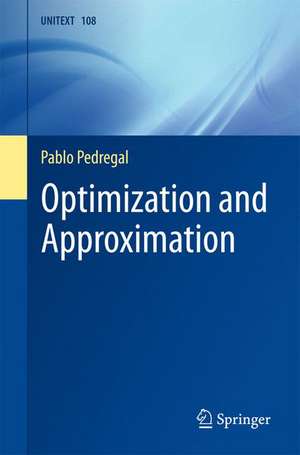Optimization and Approximation: UNITEXT, cartea 108
Autor Pablo Pedregalen Limba Engleză Paperback – 19 sep 2017
Din seria UNITEXT
-
 Preț: 458.61 lei
Preț: 458.61 lei - 17%
 Preț: 402.50 lei
Preț: 402.50 lei -
 Preț: 403.81 lei
Preț: 403.81 lei -
 Preț: 434.06 lei
Preț: 434.06 lei - 20%
 Preț: 571.53 lei
Preț: 571.53 lei -
 Preț: 277.32 lei
Preț: 277.32 lei - 13%
 Preț: 427.17 lei
Preț: 427.17 lei -
 Preț: 335.80 lei
Preț: 335.80 lei -
 Preț: 283.76 lei
Preț: 283.76 lei -
 Preț: 271.54 lei
Preț: 271.54 lei -
 Preț: 361.11 lei
Preț: 361.11 lei -
 Preț: 221.26 lei
Preț: 221.26 lei -
 Preț: 345.56 lei
Preț: 345.56 lei -
 Preț: 455.00 lei
Preț: 455.00 lei -
 Preț: 393.99 lei
Preț: 393.99 lei -
 Preț: 459.92 lei
Preț: 459.92 lei - 17%
 Preț: 364.74 lei
Preț: 364.74 lei -
 Preț: 365.15 lei
Preț: 365.15 lei - 17%
 Preț: 363.84 lei
Preț: 363.84 lei -
 Preț: 329.06 lei
Preț: 329.06 lei -
 Preț: 358.92 lei
Preț: 358.92 lei -
 Preț: 352.80 lei
Preț: 352.80 lei -
 Preț: 348.27 lei
Preț: 348.27 lei -
 Preț: 242.17 lei
Preț: 242.17 lei - 15%
 Preț: 789.30 lei
Preț: 789.30 lei -
 Preț: 295.90 lei
Preț: 295.90 lei - 15%
 Preț: 560.69 lei
Preț: 560.69 lei -
 Preț: 426.72 lei
Preț: 426.72 lei -
 Preț: 450.33 lei
Preț: 450.33 lei -
 Preț: 357.43 lei
Preț: 357.43 lei -
 Preț: 551.87 lei
Preț: 551.87 lei -
 Preț: 414.65 lei
Preț: 414.65 lei -
 Preț: 221.87 lei
Preț: 221.87 lei -
 Preț: 460.91 lei
Preț: 460.91 lei -
 Preț: 434.32 lei
Preț: 434.32 lei -
 Preț: 263.28 lei
Preț: 263.28 lei -
 Preț: 192.41 lei
Preț: 192.41 lei -
 Preț: 379.48 lei
Preț: 379.48 lei -
 Preț: 497.96 lei
Preț: 497.96 lei -
 Preț: 240.26 lei
Preț: 240.26 lei -
 Preț: 381.98 lei
Preț: 381.98 lei -
 Preț: 326.72 lei
Preț: 326.72 lei -
 Preț: 432.57 lei
Preț: 432.57 lei -
 Preț: 325.20 lei
Preț: 325.20 lei -
 Preț: 269.60 lei
Preț: 269.60 lei -
 Preț: 496.35 lei
Preț: 496.35 lei -
 Preț: 329.83 lei
Preț: 329.83 lei -
 Preț: 249.89 lei
Preț: 249.89 lei -
 Preț: 364.56 lei
Preț: 364.56 lei
Preț: 361.96 lei
Preț vechi: 436.10 lei
-17% Nou
Puncte Express: 543
Preț estimativ în valută:
69.26€ • 72.51$ • 57.31£
69.26€ • 72.51$ • 57.31£
Carte disponibilă
Livrare economică 15-29 martie
Livrare express 01-07 martie pentru 28.25 lei
Preluare comenzi: 021 569.72.76
Specificații
ISBN-13: 9783319648422
ISBN-10: 331964842X
Pagini: 254
Ilustrații: XIII, 254 p. 56 illus.
Dimensiuni: 155 x 235 x 20 mm
Greutate: 0.38 kg
Ediția:1st ed. 2017
Editura: Springer International Publishing
Colecția Springer
Seriile UNITEXT, La Matematica per il 3+2
Locul publicării:Cham, Switzerland
ISBN-10: 331964842X
Pagini: 254
Ilustrații: XIII, 254 p. 56 illus.
Dimensiuni: 155 x 235 x 20 mm
Greutate: 0.38 kg
Ediția:1st ed. 2017
Editura: Springer International Publishing
Colecția Springer
Seriile UNITEXT, La Matematica per il 3+2
Locul publicării:Cham, Switzerland
Cuprins
1 Overview. Part I Mathematical Programming. - 2 Linear Programming.- 3 Nonlinear programming.- 4 Numerical approximation.- Part II Variational problems.- 5 Basic theory for variational problems 6 Numerical approximation of variational problems.- Part III Optimal Control.- 7 Basic facts about optimal control . 8 Numerical approximation of basic optimal control problems, and dynamic programming. Part IV Appendix.- 9 Hints and solutions to exercises.
Recenzii
“This book, consisting of eight chapters, provides an introduction to optimization aimed at engineering and science students. ... This book is equally suitable to those without prior knowledge in the field as well as those already familiar with the key concepts as a useful reference. The book concludes with a very useful appendix containing hints or full solutions to the exercises presented throughout the book.” (Efstratios Rappos, zbMATH 1375.90002, 2018)
Notă biografică
Pablo Pedregal studied Mathematics at U. Complutense (1986) and received his PhD degree from the University of Minnesota at the end of 1989, under the guidance of D. Kinderlehrer. In 1990 he became associate professor at U. Complutense. During the academic year 1994-95 he moved to the young U. de Castilla-La Mancha, and in 1997 he won a full professorship. His field of interest focuses on variational techniques applied to optimization in a broad sense, including, but not limited to, calculus of variations -especially vector, non convex problems, optimal design in continuous media, optimal control, etc, and more recently he has explored variational ideas in areas like controllability, inverse problems, PDEs, and dynamical systems. Since his doctorate, he has regularly traveled to research centers in the USA and Europe. He has written more than one hundred research articles, and several specialized books.
Caracteristici
Covers the main three areas of optimization: mathematical programming (linear and non-linear), basic calculus of variations and basic optimal control Easy-to-implement approximation mechanisms treated systematically across all areas of optimization Demonstrates how to approximate optimal solutions to problems that are hard to solve manually Includes supplementary material: sn.pub/extras
